Comprehensive psoriasis treatment program
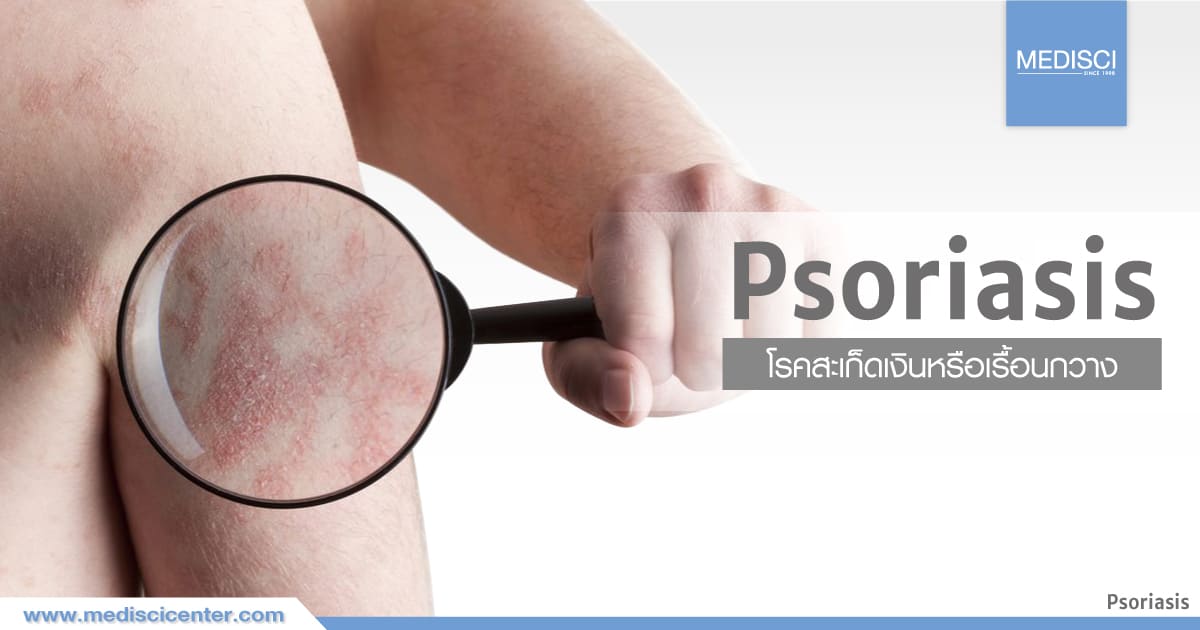
Psoriasis or Eczema
Psoriasis is a type of chronic dermatitis. It looks like a thick red emboss covered with silver-gray flakes, which are dead skin cells. If the patient scratches it, the flakes will be thicker. The extent of the rash is clearly separated from the normal skin and may have inflammation causing swelling, redness, itching, flaky or pustule often found around the elbows, knees, scalp, palms, feet, arms, legs, coccyx, and nails.
In addition, about 5-10% of psoriasis patients may have arthritis. There will be joint pain in the joints, fingers, toes, or backbones. The symptoms will gradually appear, but, in some people, they may have acute symptoms. Psoriasis found in about 1-3 percent of the common people can occur in all ages, aged 11-45 years, and about 30 percent of patients are teenagers. Psoriasis is a disease that is not caused by germs and is a contagious disease.
Therefore, it cannot be contacted by touch, breathing, or eating. Psoriasis is caused by abnormalities of the cell division control system. The epidermis cells will divide up to 1000 times faster than normal and move from the subcutaneous layer up to the epidermis from 21-28 days to 2-6 days. In general, skin cells will take time to divide and grow to replace the old cells that die every 21-28 days, but, in patients with psoriasis, the skin cells divide very quickly every 2-6 days, causing the skin to become thicker. In addition, the arteries in the dermis are expanding causing the skin to return to redness, and the skin cells are lack of bonding. Therefore, the outer skin layers peel themselves and become flaky in some cases.
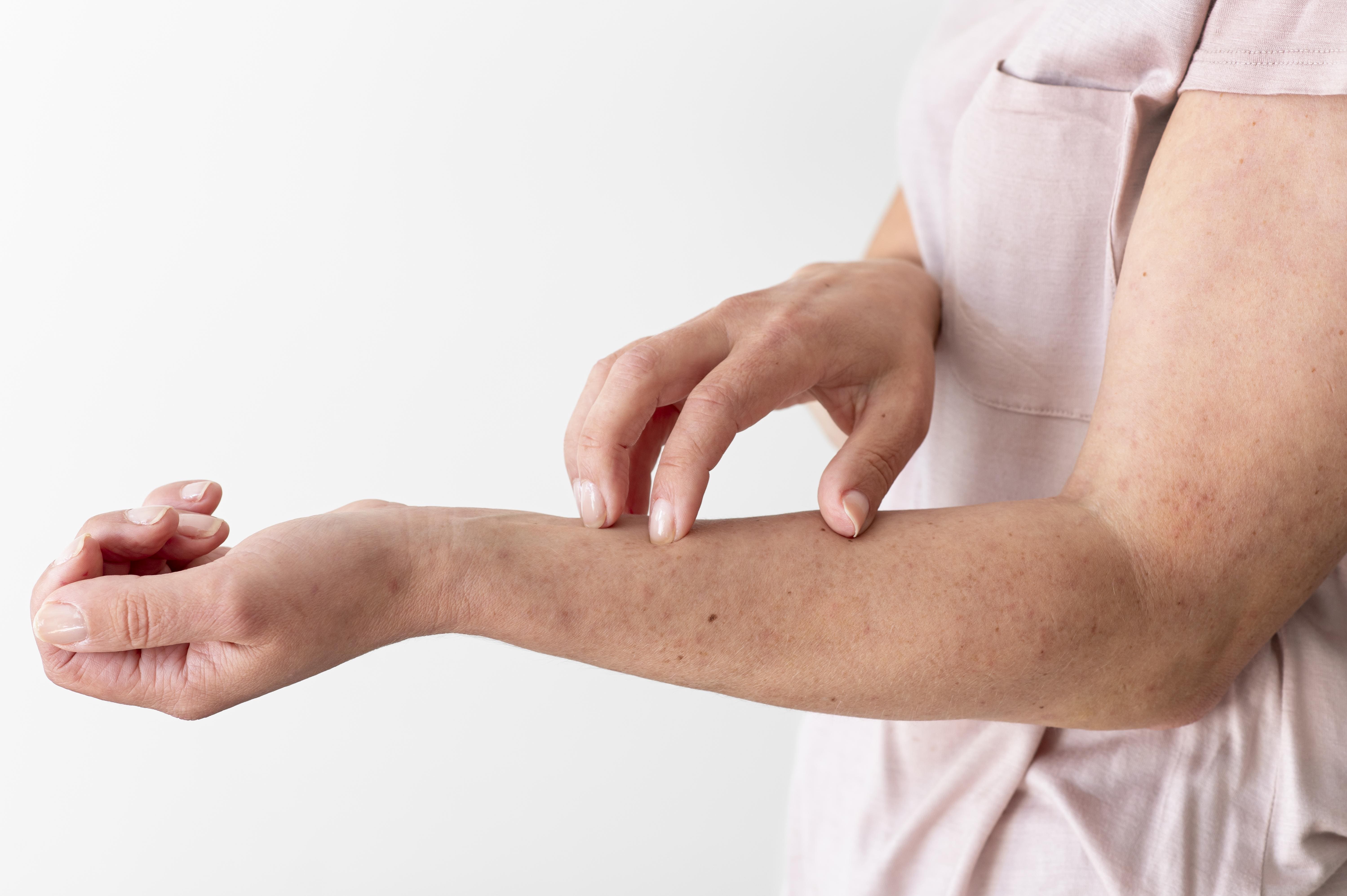
The Causes of Psoriasis
In present, the exact cause is still not found, but the general causes are as follows:
1. Causes from the internal factor include
- Genetic psoriasis is caused by a genetic disorder and can be hereditary. If the father or mother is only psoriasis, children will have a chance of being psoriasis about 1%, but if both parents are psoriasis, children will have an opportunity up to 41%. In addition, it is found that about half of patients with psoriasis. There will be at least one member in the family suffering from the same disease.
- The immune system found that patients with psoriasis may have abnormalities in the immune system that respond to skin components. Normally, T-cells protect cells and destroy foreign objects or germs. In contrast, in patients with psoriasis, T-cells are stimulated to release Leukotrienes which cause skin inflammation and encouraged the epidermis to divide faster than usual causing thicker skin.
- Defective digestion and absorption of impaired protein in the small intestine causing many amino-acid residues digested by bacteria in the digestive tract to affect various types of toxins, such as polyamine, which results in rapidly dividing cells and impaired liver function. If the liver is unable to eliminate the toxins in the body, it will make the body full of toxins which will cause the symptoms of psoriasis to aggravate and become more severe.
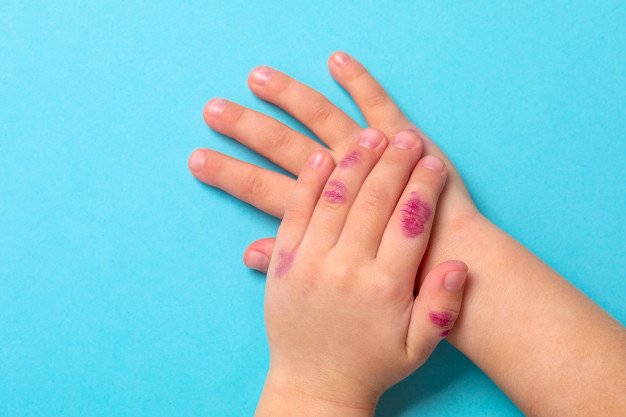
2. Causes from external factors
stimulate the symptoms of the disease and become chronic, including
- Stress if the patient has stress-affected psychological pressure causing the recurring of symptoms or severe symptoms.
- Skin injuries or wounds, such as scratches, sunburns, etc. Therefore, if the patients with psoriasis are cut by sharp objects, burned, scalded, or even got a small abrasion. It may cause a rash in that area.
- Certain drug intolerance, such as chloroquine, beta-blockers, oral contraceptives, non-steroidal anti-inflammatory drugs
- Certain food sensitivity found that avoiding eating allergic foods improved the symptoms of psoriasis
- Drinking alcohol, alcohol can damage the lining of the digestive tract allowing toxins to pass through the digestive tract more easily and impair liver function as well as cannot eliminate toxic substances as usual. When the body has more toxins, it will make the symptoms of the disease worse. - Smoking the nicotine in cigarettes, smoke will stimulate dermatitis and cause skin irritation.
- The lack of certain nutrients, for example in patients with psoriasis, vitamin A deficiency, B vitamins, zinc minerals, and certain fatty acids
- Exposure to toxins or chemicals such as detergents, Chinese medicine, pot medicine, certain steroids may cause skin irritation.
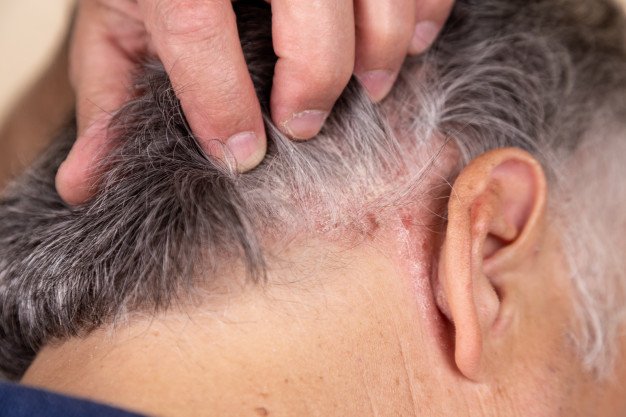
Comprehensive psoriasis treatment program
Psoriasis is an incurable disease. It is chronic, but we can mitigate its symptoms. The duration of the disease can be found from 1 - 54 years. The symptoms of each patient will be recovered soon or not, depending on the individual's behavior. Therefore, the goal of treatment is to alleviate the symptoms of the patient with the least side effects. Moreover, patients should receive ongoing treatment.
The holistic psoriasis treatment program focuses on changing daily life habits, such as taking foods or supplements, applying herbal creams, exercising, and detoxification with various methods. This will reduce the side effects of using topical drugs, using light, or taking medication. Holistic treatment is considered as a safe and alternative method for treating and relieving psoriasis symptoms. The instructions are as follows:
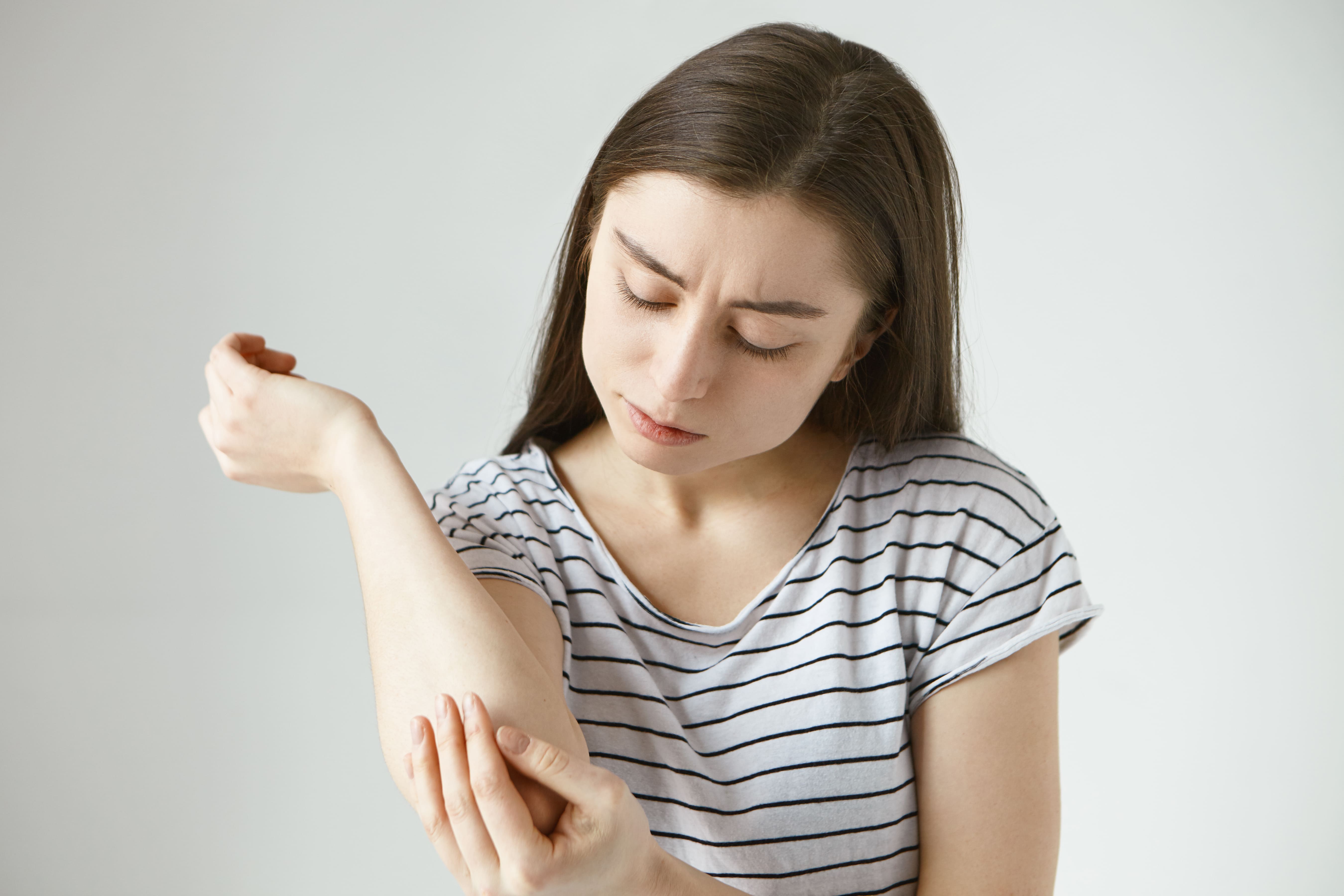
1. Avoid Stimuli that Cause Disease
- Manage stress and anxiety by meditating, breathing focusing, or hobbies like reading, listening to music, watching movies, etc., and getting enough sleep.
- Do not peel or scratch the skin and be careful to not cause the wound.
- Do not smoke or inhale cigarettes because nicotine in cigarettes will stimulate dermatitis and can cause skin irritation.
2. Apply Cream Containing Herbs
such as capsaicin from chili, aloe vera, licorice root, and chamomile to reduce inflammation and relieve itchy, redness, and pain in psoriasis patients.
3. Nutrition Therapy with Dietary Modifications
- Should choose natural foods that are free from additives including coloring agents, flavors, or preservatives
- Should eat vegetables and fruits, especially apples, berries, tomatoes, onions, broccoli, spinach, and carrots, which have a variety of antioxidants. Therefore, they reduce inflammation and are rich in dietary fiber that improves the normal digestive system to function, reduces constipation problems, and accelerates the elimination of toxic substances from the body.
- Do not eat monotonous food. Should eat a variety of types and change the types of food every day. The same type of food should not be eaten within 3-4 days to prevent food allergies. Diverse foods allow the body to receive many nutrients and reduce the amount of chemicals added to food that are eaten repeatedly.
- Avoid allergic foods. Some patients may not know that they have psoriasis due to chronic food allergies. Therefore, you should be tested for any food allergies from blood collection and strictly avoid eating allergic foods since it will cause skin inflammation and worsen symptoms of psoriasis.
- Avoid eating fermented foods, spicy foods, soft drinks, coffee, and acidic foods such as tomatoes, oranges, and lemons as these foods can stimulate the symptoms of psoriasis.
- Avoid eating red meat, milk, dairy products, and wheat because these foods contain substances that cause inflammation.
- Avoid eating foods containing wheat, corn, and eggs because most people are allergic to these foods. When stop eating these foods, patients tend to get better.
- Eat sea fish that are high in omega 3, including salmon, sardines, mackerel, tuna, and herring at least 3 times a week to alleviate the inflammation of the skin rash.
- Drink enough clean water at least 8 glasses per day to accelerate the excretion of toxins and help the skin to be moist, not dry, not peeling, or flaky
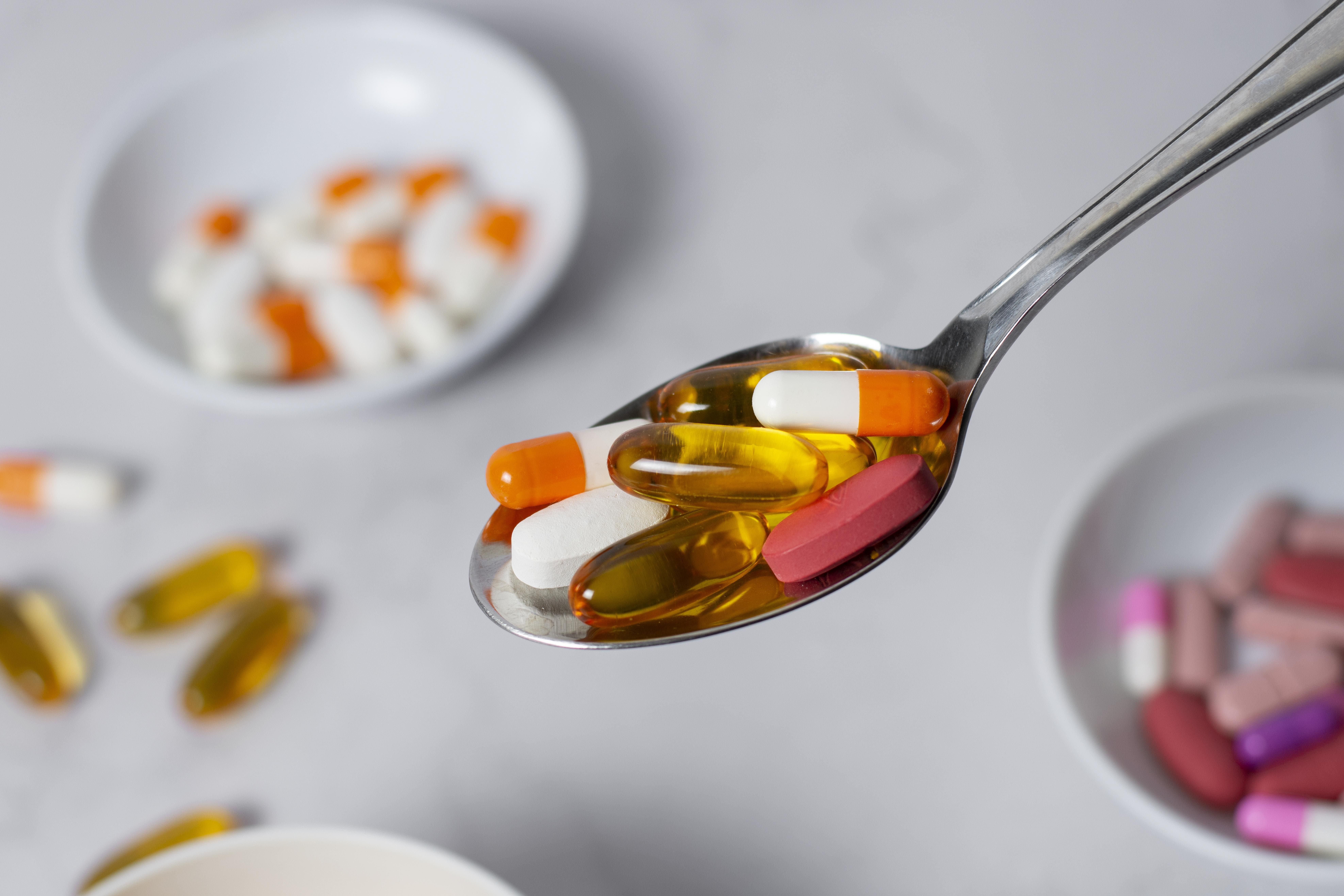
4. Eat Nutritional Supplements that Relieve Psoriasis Symptoms
- Vitamin A should be taken in the form of beta carotene, which is highly safe and reduces the production of toxic polyamine. Therefore, it reduces cell division
- Total vitamin B, including vitamins B1, B5, B6, B12, and folate, are necessary for cell function. Those can repair skin, heal wounds, and reduce infection. Therefore, it is able to alleviate the symptoms of psoriasis.
- Vitamin C, vitamin K, warfarin, Vitamin E, and Shark Cartilage Extract reduce the occurrence of free radicals and strengthen the immune system. Therefore, it can decrease the severity and reduce the inflammation, swelling, and itching of the skin in patients with psoriasis
- Vitamin D in the form of vitamin D3 controls the function of T-cells, thereby reducing the division of skin cells.
- Milk Thistle contains flavonoids called Silymarin which has the effect of protecting the liver from destruction by toxins or drugs. It repairs cells and restores liver cells to function efficiently. It is also antioxidant and anti-inflammatory since it reduces the production of Leukotrienes that cause inflammation and decreases the activity of T-cells in the immune system. It thus reduces the division of skin cells.
- Fumaric acid acts by inhibiting the activity of T-cells in the immune system and reducing skin cell division in psoriasis patients.
- Fish oil contains omega-3 fatty acids called EPA and DHA. EPA fatty acids improve the production of Leukotrienes that cause inflammation. It, therefore, reduces inflammation and the division of skin cells. It also relieves the symptoms of arthritis in patients with arthritis from psoriasis.
- Flax seed oil contains Omega-3 fatty acids that prevent inflammation. It thus reduces inflammation and relieves arthritis symptoms in patients with arthritis from psoriasis.
- Evening Primrose Oil consists of Omega-6 fatty acids moisturizing the skin and reducing the inflammation of the skin.
- Zinc mineral heals the wound and enhances immune system function.
- Digestive enzymes such as Amylase, Lipase, Protease, Bromelain, etc. increase the efficiency of the digestive system to digest and absorb nutrients better, thereby reducing the occurrence of toxins in the body. It also reduces inflammation and strengthens the immune system of the digestive tract to alleviate the symptoms of psoriasis.

5. Regular exercise
such as running, will speed up the excretion of wastes and toxins from the body. It also increases blood flow and stimulates the immune system, which will improve the symptoms of psoriasis.
6. Vascular detoxification
Chelation is a type of intravenous detoxification using EDTA (Ethyline Diamine Tetra Acetic Acid) mixed with vitamins and minerals that have an antioxidant effect to get rid of toxic heavy metals such as lead, mercury, and arsenic as well as heavy metals such as iron, copper, and zinc, which are beneficial to the body, but if it has accumulated in the artery wall, it may cause the diseases.
Chelation also reduces the amount of free radicals and inflammation. As a result, we can consider chelation as an auxiliary therapy that will relieve dermatitis, rash, itching, and redness. EDTA is highly safe because the body can get rid of this substance in 48 hours via urine, and there is no accumulation in the body. Therefore, there are no serious side effects. However, some people may have headaches, skin irritation, diarrhea, and tiredness in the beginning of the operation.
- Oxygen Therapy (H.O.T.): the use of pure oxygen mixed with the blood through the process of ultraviolet radiation causing the blood cells to become very soft, so it can flow easily through the blood vessels, bring nutrients and oxygen to nourish cells and restore damaged cells efficiently. It also acts against inflammation as well as heals the wound, so it can alleviate and treat the symptoms of chronic psoriasis without serious side effects. Nonetheless, some people may have symptoms of fatigue, fever, or tremor due to the elimination of poisoning in the body, which will occur during the first days of the operation. Then the symptoms will gradually improve. The duration of the treatment is approximately 1/2 hour/time for psoriasis patients. Should be done 2 times a week for 3 weeks and then should be done once a week for 4 weeks and gradually decrease every 2 months.
- H2O2 (Hydrogen peroxide): H2O2 can be created in every cell. It is responsible for controlling the generation of energy, stimulating the immune system, and destroying the virus, mold, and yeast. Moreover, it increases blood flow as well as reduces blood clots and chronic pain. Therefore, it can be used to treat and relieve pain, rash, inflammation, and redness of psoriasis. Detoxification by providing H2O2 is highly safe as our body has an enzyme catalase that converts H2O2 into oxygen and water.

7. Infrared Sauna
An infrared Sauna is a use of machine that produces infrared heat which can penetrate the skin deep down to the fat layer, an area where toxins are accumulating, and it rises the body's temperature. It also accelerates sweat and toxins including heavy metals, chemicals, and any substance dissolved in fat to come out with sweat.
It helps blood flow better causing various cells to receive more nutrients and oxygen to repair skin cells and relieve of dermatitis, chronic rash, itching, and swelling. In addition, it reduces inflammation, pain, and swelling of the joints for those with psoriatic arthritis. It is considered as a highly safe method and harmless to cells, tissues, and organs of the body. It is commonly used in hospitals such as newborn incubators. Although there are no serious side effects, the skin may become dry and rough for a while after treatment. Should apply lotion and drink plenty of water within 24 hours after the treatment.
Contact Us
- Call center: 089-9006100
- North Park (Ngam Wong Wan): 02-954-9440
- Ratchapruek: 02-863-8765
- Sukhumvit 39: 02-259-6992
- Line OA: @MEDISCI





